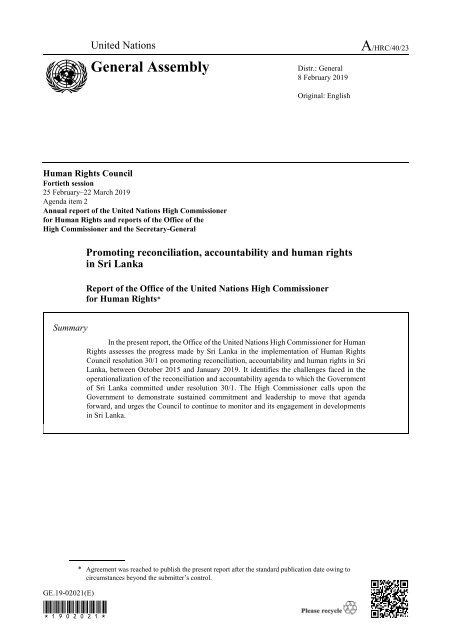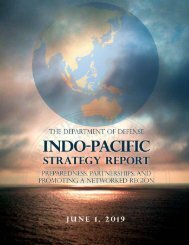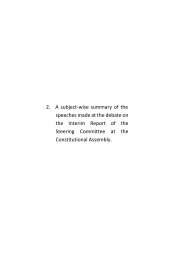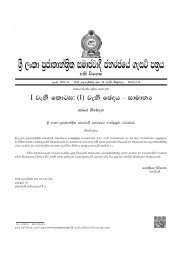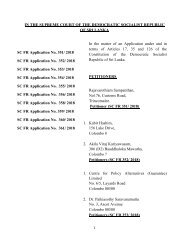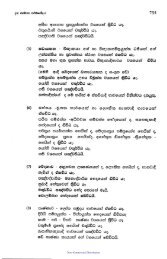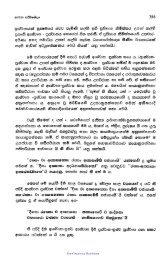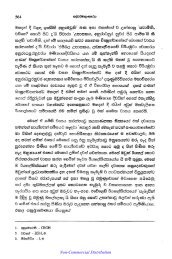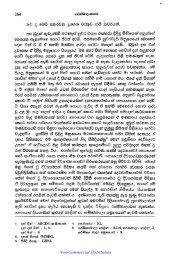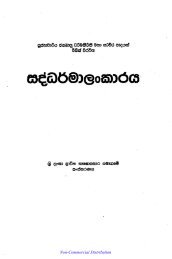Report of the Office of the United Nations High Commissioner for Human Rights In Sri Lanka
Create successful ePaper yourself
Turn your PDF publications into a flip-book with our unique Google optimized e-Paper software.
<strong>United</strong> <strong>Nations</strong><br />
General Assembly<br />
Distr.: General<br />
8 February 2019<br />
Original: English<br />
A/HRC/40/23<br />
<strong>Human</strong> <strong>Rights</strong> Council<br />
Fortieth session<br />
25 February–22 March 2019<br />
Agenda item 2<br />
Annual report <strong>of</strong> <strong>the</strong> <strong>United</strong> <strong>Nations</strong> <strong>High</strong> <strong>Commissioner</strong><br />
<strong>for</strong> <strong>Human</strong> <strong>Rights</strong> and reports <strong>of</strong> <strong>the</strong> <strong>Office</strong> <strong>of</strong> <strong>the</strong><br />
<strong>High</strong> <strong>Commissioner</strong> and <strong>the</strong> Secretary-General<br />
Promoting reconciliation, accountability and human rights<br />
in <strong>Sri</strong> <strong>Lanka</strong><br />
<strong>Report</strong> <strong>of</strong> <strong>the</strong> <strong>Office</strong> <strong>of</strong> <strong>the</strong> <strong>United</strong> <strong>Nations</strong> <strong>High</strong> <strong>Commissioner</strong><br />
<strong>for</strong> <strong>Human</strong> <strong>Rights</strong>*<br />
Summary<br />
<strong>In</strong> <strong>the</strong> present report, <strong>the</strong> <strong>Office</strong> <strong>of</strong> <strong>the</strong> <strong>United</strong> <strong>Nations</strong> <strong>High</strong> <strong>Commissioner</strong> <strong>for</strong> <strong>Human</strong><br />
<strong>Rights</strong> assesses <strong>the</strong> progress made by <strong>Sri</strong> <strong>Lanka</strong> in <strong>the</strong> implementation <strong>of</strong> <strong>Human</strong> <strong>Rights</strong><br />
Council resolution 30/1 on promoting reconciliation, accountability and human rights in <strong>Sri</strong><br />
<strong>Lanka</strong>, between October 2015 and January 2019. It identifies <strong>the</strong> challenges faced in <strong>the</strong><br />
operationalization <strong>of</strong> <strong>the</strong> reconciliation and accountability agenda to which <strong>the</strong> Government<br />
<strong>of</strong> <strong>Sri</strong> <strong>Lanka</strong> committed under resolution 30/1. The <strong>High</strong> <strong>Commissioner</strong> calls upon <strong>the</strong><br />
Government to demonstrate sustained commitment and leadership to move that agenda<br />
<strong>for</strong>ward, and urges <strong>the</strong> Council to continue to monitor and its engagement in developments<br />
in <strong>Sri</strong> <strong>Lanka</strong>.<br />
* Agreement was reached to publish <strong>the</strong> present report after <strong>the</strong> standard publication date owing to<br />
circumstances beyond <strong>the</strong> submitter’s control.<br />
GE.19-02021(E)
A/HRC/40/23<br />
I. <strong>In</strong>troduction<br />
1. The present report on progress achieved in promoting reconciliation, accountability<br />
and human rights in <strong>Sri</strong> <strong>Lanka</strong> is submitted to <strong>the</strong> <strong>Human</strong> <strong>Rights</strong> Council pursuant to Council<br />
resolutions 30/1 and 34/1. Both <strong>of</strong> <strong>the</strong> said resolutions were co-sponsored by <strong>the</strong> Government<br />
<strong>of</strong> <strong>Sri</strong> <strong>Lanka</strong> and adopted by consensus.<br />
2. The report should be read in conjunction with <strong>the</strong> most recent reports <strong>of</strong> <strong>the</strong> <strong>Office</strong> <strong>of</strong><br />
<strong>the</strong> <strong>United</strong> <strong>Nations</strong> <strong>High</strong> <strong>Commissioner</strong> <strong>for</strong> <strong>Human</strong> <strong>Rights</strong> (OHCHR) on <strong>Sri</strong> <strong>Lanka</strong><br />
(A/HRC/34/20 and A/HRC/37/23), <strong>the</strong> oral update <strong>of</strong> <strong>the</strong> <strong>High</strong> <strong>Commissioner</strong> delivered to<br />
<strong>the</strong> <strong>Human</strong> <strong>Rights</strong> Council at its thirty-fourth session, 1 <strong>the</strong> comprehensive report <strong>of</strong> OHCHR<br />
on <strong>Sri</strong> <strong>Lanka</strong> (A/HRC/30/61) and <strong>the</strong> detailed findings <strong>of</strong> <strong>the</strong> OHCHR investigation <strong>the</strong>re<strong>of</strong>. 2<br />
3. <strong>In</strong> its resolution 34/1, <strong>the</strong> <strong>Human</strong> <strong>Rights</strong> Council requested <strong>the</strong> Government <strong>of</strong> <strong>Sri</strong><br />
<strong>Lanka</strong> to implement fully <strong>the</strong> outstanding measures identified by <strong>the</strong> Council in its resolution<br />
30/1. It also requested OHCHR and relevant special procedure mandate holders, in<br />
consultation with, and with <strong>the</strong> concurrence <strong>of</strong>, <strong>the</strong> Government <strong>of</strong> <strong>Sri</strong> <strong>Lanka</strong>, to streng<strong>the</strong>n<br />
<strong>the</strong>ir advice and technical assistance on <strong>the</strong> promotion and protection <strong>of</strong> human rights and<br />
truth, justice, reconciliation and accountability. The Council also requested OHCHR to<br />
continue to assess progress in <strong>the</strong> implementation <strong>of</strong> its recommendations and o<strong>the</strong>r relevant<br />
processes relating to reconciliation, accountability and human rights in <strong>Sri</strong> <strong>Lanka</strong>, and to<br />
present a comprehensive report, followed by a discussion on <strong>the</strong> implementation <strong>of</strong> resolution<br />
30/1, at its <strong>for</strong>tieth session. The present report was prepared pursuant to that request.<br />
4. <strong>In</strong> its resolution 30/1, <strong>the</strong> <strong>Human</strong> <strong>Rights</strong> Council made a number <strong>of</strong> comprehensive<br />
recommendations on <strong>the</strong> judicial and non-judicial measures necessary to advance<br />
accountability and reconciliation in <strong>Sri</strong> <strong>Lanka</strong>, and on streng<strong>the</strong>ning <strong>the</strong> protection <strong>of</strong> human<br />
rights, democracy and <strong>the</strong> rule <strong>of</strong> law. The resolution reflects <strong>the</strong> commitment <strong>of</strong> <strong>the</strong><br />
Government <strong>of</strong> <strong>Sri</strong> <strong>Lanka</strong> to <strong>the</strong> international community and to its own people to confronting<br />
<strong>the</strong> past, ending impunity, ensuring justice, achieving reconciliation and preventing <strong>the</strong><br />
recurrence <strong>of</strong> violations. <strong>In</strong> resolution 34/1, <strong>the</strong> Council extended <strong>the</strong> period <strong>of</strong><br />
implementation identified in resolution 30/1 until its <strong>for</strong>tieth session, namely <strong>for</strong> a fur<strong>the</strong>r<br />
period <strong>of</strong> two years.<br />
5. <strong>In</strong> <strong>the</strong> present report, OHCHR reviews <strong>the</strong> progress made by <strong>the</strong> Government <strong>of</strong> <strong>Sri</strong><br />
<strong>Lanka</strong> between October 2015 and January 2019 in implementing resolution 30/1, paying<br />
special attention to <strong>the</strong> period since January 2018, not covered in previous reports.<br />
II. Engagement <strong>of</strong> <strong>the</strong> Government with <strong>the</strong> <strong>Office</strong> <strong>of</strong> <strong>the</strong> <strong>High</strong><br />
<strong>Commissioner</strong> and <strong>United</strong> <strong>Nations</strong> human rights mechanisms<br />
6. Since <strong>the</strong> adoption by <strong>the</strong> <strong>Human</strong> <strong>Rights</strong> Council <strong>of</strong> its resolution 30/1, <strong>the</strong><br />
Government <strong>of</strong> <strong>Sri</strong> <strong>Lanka</strong> has regularly engaged with <strong>the</strong> <strong>United</strong> <strong>Nations</strong> system, including<br />
with OHCHR. The <strong>High</strong> <strong>Commissioner</strong>, <strong>the</strong> Deputy <strong>High</strong> <strong>Commissioner</strong> and senior OHCHR<br />
staff have visited <strong>Sri</strong> <strong>Lanka</strong> since 2015. OHCHR has continued to provide <strong>the</strong> Government<br />
with technical assistance through its presence in <strong>Sri</strong> <strong>Lanka</strong> and by deploying expert missions.<br />
<strong>In</strong> 2018, OHCHR contributed to <strong>the</strong> human rights screening <strong>of</strong> <strong>Sri</strong> <strong>Lanka</strong>n individuals and<br />
units to be deployed to <strong>United</strong> <strong>Nations</strong> peacekeeping operations, and assisted in <strong>the</strong> archiving<br />
<strong>of</strong> materials resulting from <strong>the</strong> national consultations on <strong>the</strong> reconciliation mechanisms<br />
conducted in 2016 by <strong>the</strong> Consultations Task Force, a group <strong>of</strong> civil society representatives<br />
appointed by <strong>the</strong> Government <strong>of</strong> <strong>Sri</strong> <strong>Lanka</strong>. OHCHR also provided advice and support on<br />
various aspects <strong>of</strong> transitional justice, including through <strong>the</strong> <strong>United</strong> <strong>Nations</strong> Peacebuilding<br />
Fund, in coordination with <strong>the</strong> <strong>United</strong> <strong>Nations</strong> country team and <strong>the</strong> Resident Coordinator.<br />
OHCHR also supported dialogues with <strong>the</strong> Government on <strong>the</strong> establishment <strong>of</strong> a national<br />
1<br />
See conference room paper A/HRC/32/CRP.4, available from<br />
www.ohchr.org/en/hrbodies/hrc/regularsessions/session32/pages/listreports.aspx.<br />
2<br />
See conference room paper A/HRC/30/CRP.2, available from<br />
www.ohchr.org/en/hrbodies/hrc/pages/oisl.aspx.<br />
2
A/HRC/40/23<br />
mechanism <strong>for</strong> reporting and follow-up on recommendations made in <strong>the</strong> context <strong>of</strong> <strong>the</strong><br />
universal periodic review and by <strong>the</strong> treaty bodies and <strong>the</strong> special procedures <strong>of</strong> <strong>the</strong> Council.<br />
7. The constructive engagement <strong>of</strong> <strong>the</strong> Government <strong>of</strong> <strong>Sri</strong> <strong>Lanka</strong> with <strong>United</strong> <strong>Nations</strong><br />
human rights mechanisms continued throughout <strong>the</strong> period under review. Since <strong>the</strong><br />
Government issued a standing invitation to all special procedures in 2015, <strong>Sri</strong> <strong>Lanka</strong> has<br />
received a visit from <strong>the</strong> Working Group on En<strong>for</strong>ced or <strong>In</strong>voluntary Disappearances (see<br />
A/HRC/33/51/Add.2), <strong>the</strong> Special Rapporteur on torture and o<strong>the</strong>r cruel, inhuman and<br />
degrading treatment or punishment (see A/HRC/34/54/Add.2), <strong>the</strong> Special Rapporteur on <strong>the</strong><br />
independence <strong>of</strong> judges and lawyers (see A/HRC/35/31/Add.1), <strong>the</strong> Special Rapporteur on<br />
minority issues (see A/HRC/34/53/Add.3), <strong>the</strong> Special Rapporteur on <strong>the</strong> promotion and<br />
protection <strong>of</strong> human rights and fundamental freedoms while countering terrorism (see<br />
A/HRC/40/52/Add.3), <strong>the</strong> Working Group on Arbitrary Detention (see<br />
A/HRC/39/45/Add.2), <strong>the</strong> <strong>In</strong>dependent Expert on <strong>the</strong> effects <strong>of</strong> <strong>for</strong>eign debt and o<strong>the</strong>r related<br />
international financial obligations <strong>of</strong> States on <strong>the</strong> full enjoyment <strong>of</strong> all human rights (see<br />
A/HRC/40/57/Add.2) and <strong>the</strong> Special Rapporteur on truth, justice, reparations and guarantees<br />
<strong>of</strong> non-recurrence, who made one country visit and four advisory visits. 3<br />
8. Since 2015, <strong>the</strong> situation in <strong>Sri</strong> <strong>Lanka</strong> has been examined by <strong>the</strong> Committee on <strong>the</strong><br />
Protection <strong>of</strong> <strong>the</strong> <strong>Rights</strong> <strong>of</strong> All Migrant Workers and Members <strong>of</strong> Their Families<br />
(CMW/C/LKA/CO/2), <strong>the</strong> Committee on <strong>the</strong> Elimination <strong>of</strong> Racial Discrimination<br />
(CERD/C/LKA/CO/10-17), <strong>the</strong> Committee against Torture (CAT/C/LKA/CO/5), <strong>the</strong><br />
Committee on <strong>the</strong> Elimination <strong>of</strong> Discrimination against Women (CEDAW/C/LKA/CO/8),<br />
<strong>the</strong> Committee on Economic, Social and Cultural <strong>Rights</strong> (E/C.12/LKA/CO/5) and <strong>the</strong><br />
Committee on <strong>the</strong> <strong>Rights</strong> <strong>of</strong> <strong>the</strong> Child (CRC/C/LKA/CO/5-6). <strong>In</strong> November 2017, <strong>the</strong> State<br />
underwent its third universal periodic review by <strong>the</strong> <strong>Human</strong> <strong>Rights</strong> Council (see<br />
A/HRC/37/17 and Council decision 37/114).<br />
9. Noting <strong>the</strong> ef<strong>for</strong>ts made by <strong>Sri</strong> <strong>Lanka</strong> to engage with <strong>United</strong> <strong>Nations</strong> human rights<br />
mechanisms, <strong>the</strong> <strong>High</strong> <strong>Commissioner</strong> welcomes <strong>the</strong> preparations it has made in view <strong>of</strong><br />
establishing a national mechanism <strong>for</strong> reporting and follow-up, which, alongside <strong>the</strong> National<br />
<strong>Human</strong> <strong>Rights</strong> Action Plan, could facilitate <strong>the</strong> implementation <strong>of</strong> key recommendations<br />
made by <strong>the</strong> said <strong>United</strong> <strong>Nations</strong> human rights mechanisms.<br />
III. Developments in reconciliation and accountability<br />
A. Background<br />
10. While <strong>the</strong> focus <strong>of</strong> <strong>the</strong> present report is <strong>the</strong> implementation by <strong>the</strong> Government <strong>of</strong> <strong>Sri</strong><br />
<strong>Lanka</strong> <strong>of</strong> <strong>the</strong> recommendations made by <strong>the</strong> <strong>Human</strong> <strong>Rights</strong> Council in its resolution 30/1, <strong>the</strong><br />
<strong>High</strong> <strong>Commissioner</strong> notes <strong>the</strong> political crisis that erupted in October 2018 and <strong>the</strong> associated<br />
concerns about a possible regression in human rights, transitional justice and <strong>the</strong><br />
reconciliation agenda, and related mechanisms.<br />
11. On 26 October 2018, President Sirisena removed Prime Minister Ranil<br />
Wickremesinghe from <strong>of</strong>fice and replaced him with <strong>for</strong>mer President Mahinda Rajapaksa.<br />
Mr. Wickremesinghe argued that President Sirisena had no constitutional power to dismiss<br />
him given that he still enjoyed <strong>the</strong> confidence <strong>of</strong> <strong>the</strong> parliament. <strong>Sri</strong> <strong>Lanka</strong> was left in an<br />
unprecedented situation, with two individuals claiming to be <strong>the</strong> legitimate Prime Minister.<br />
12. On 9 November 2018, President Sirisena dissolved <strong>the</strong> parliament and called<br />
parliamentary elections. On 13 November, <strong>the</strong> Supreme Court suspended <strong>the</strong> dissolution <strong>of</strong><br />
<strong>the</strong> parliament, which reconvened on 14 November 2018 and passed two motions <strong>of</strong> no<br />
confidence against <strong>the</strong> Government <strong>of</strong> Mahinda Rajapaksa, amidst disruptions and violence<br />
among members <strong>of</strong> parliament. President Sirisena rejected <strong>the</strong> motions, citing procedural<br />
grounds. On 3 December, an interim order from <strong>the</strong> Court <strong>of</strong> Appeal, upheld by <strong>the</strong> Supreme<br />
3<br />
See OHCHR, “Observations by <strong>the</strong> Special Rapporteur on <strong>the</strong> promotion <strong>of</strong> truth, justice, reparation<br />
and guarantees <strong>of</strong> non-recurrence, Mr. Pablo de Greiff, on <strong>the</strong> conclusion <strong>of</strong> his recent visit to<br />
<strong>Sri</strong> <strong>Lanka</strong>”, press release.<br />
3
A/HRC/40/23<br />
Court on 14 December, restrained <strong>the</strong> functioning <strong>of</strong> <strong>the</strong> Prime Minister and Cabinet. On<br />
13 December, <strong>the</strong> Supreme Court decided that Presidential Gazette No. 2096/70 that<br />
dissolved <strong>the</strong> parliament was ultra vires and unconstitutional. On 15 December, Mahinda<br />
Rajapaksa resigned, and on 16 December Ranil Wickremesinghe was once again sworn in as<br />
Prime Minister.<br />
13. The <strong>High</strong> <strong>Commissioner</strong> joins <strong>the</strong> Secretary-General in welcoming <strong>the</strong> resolution <strong>of</strong><br />
<strong>the</strong> political crisis in <strong>Sri</strong> <strong>Lanka</strong> through peaceful, constitutional means, and applauds <strong>the</strong><br />
resilience <strong>of</strong> <strong>the</strong> country’s democratic institutions. None<strong>the</strong>less, <strong>for</strong> seven weeks, <strong>the</strong><br />
legitimacy and <strong>the</strong> legality <strong>of</strong> a number <strong>of</strong> authorities were in question, which led to fur<strong>the</strong>r<br />
delays in <strong>the</strong> implementation <strong>of</strong> <strong>the</strong> recommendations made in <strong>Human</strong> <strong>Rights</strong> Council<br />
resolution 30/1, <strong>for</strong> instance owing to staff changes in key institutions and uncertainty with<br />
regard to reporting lines.<br />
B. Developments in transitional justice<br />
14. <strong>In</strong> <strong>Human</strong> <strong>Rights</strong> Council resolution 30/1, <strong>the</strong> Council encouraged <strong>the</strong> Government <strong>of</strong><br />
<strong>Sri</strong> <strong>Lanka</strong> to implement a transitional process, which would entail <strong>the</strong> establishment <strong>of</strong> a<br />
judicial accountability mechanism, truth-seeking initiatives, including a truth commission,<br />
and an <strong>of</strong>fice on missing persons, a reparations programme and institutional re<strong>for</strong>ms.<br />
15. <strong>In</strong> <strong>the</strong> most recent report on <strong>the</strong> implementation <strong>of</strong> <strong>Human</strong> <strong>Rights</strong> Council resolution<br />
30/1 submitted to <strong>the</strong> Council in February 2018 (A/HRC/37/23), <strong>the</strong> <strong>High</strong> <strong>Commissioner</strong><br />
noted that, while <strong>the</strong> institutional architecture had been incipiently established to take <strong>the</strong><br />
transitional justice process <strong>for</strong>ward, concrete results were yet to come. As at December 2018,<br />
this remained <strong>the</strong> case. Although steps have been taken in institution-building (such as<br />
adoption <strong>of</strong> legislation, <strong>the</strong> recruitment and training <strong>of</strong> staff and <strong>the</strong> identification <strong>of</strong> <strong>of</strong>fice<br />
space) since 2017, <strong>the</strong>y have yet to produce concrete benefits <strong>for</strong> individual rights holders (in<br />
<strong>the</strong> <strong>for</strong>m <strong>of</strong>, <strong>for</strong> instance, <strong>the</strong> identification <strong>of</strong> missing persons, <strong>the</strong> provision <strong>of</strong> reparations<br />
and <strong>the</strong> issuance <strong>of</strong> court verdicts). Such slow progress in establishing meaningful transitional<br />
justice measures has engendered mistrust among victims and o<strong>the</strong>r stakeholders.<br />
16. The political crisis at <strong>the</strong> end <strong>of</strong> 2018 fur<strong>the</strong>r obstructed progress owing not only to<br />
<strong>the</strong> temporary paralysis <strong>of</strong> institutions but also because it generated fears that ano<strong>the</strong>r<br />
Government might not embrace <strong>the</strong> reconciliation agenda. There were also concerns among<br />
key stakeholders that a return to power <strong>of</strong> <strong>the</strong> pre-2015 administration could have negative<br />
implications <strong>for</strong> <strong>the</strong>ir security and <strong>the</strong> human rights situation in general. <strong>In</strong> particular, during<br />
<strong>the</strong> crisis, <strong>the</strong> work <strong>of</strong> <strong>the</strong> Secretariat <strong>for</strong> Coordinating Reconciliation Mechanisms 4 – <strong>the</strong><br />
body mandated to lead and coordinate transitional justice ef<strong>for</strong>ts – was hampered, given that<br />
its Secretary-General had resigned on 30 October and a number <strong>of</strong> its staff contracts were<br />
terminated on 30 November. Some staff members were reportedly subjected to surveillance<br />
and threats within hours <strong>of</strong> <strong>the</strong> removal <strong>of</strong> Prime Minister Wickremesinghe. The Secretary-<br />
General and staff resumed <strong>the</strong>ir work in late December.<br />
17. The <strong>High</strong> <strong>Commissioner</strong> acknowledges <strong>the</strong> ef<strong>for</strong>ts made to establish bodies like <strong>the</strong><br />
Secretariat <strong>for</strong> Coordinating Reconciliation Mechanisms and <strong>the</strong> <strong>Office</strong> <strong>for</strong> National Unity<br />
and Reconciliation, and applauds <strong>the</strong> commitment and pr<strong>of</strong>essionalism <strong>of</strong> <strong>the</strong>ir staff. The<br />
Government has, however, lagged in <strong>the</strong> actual implementation <strong>of</strong> its commitments, beyond<br />
<strong>the</strong> establishment <strong>of</strong> coordinating bodies. The situation has been compounded by <strong>the</strong> lack <strong>of</strong><br />
a comprehensive strategy or action plan setting out a timeline <strong>for</strong> <strong>the</strong> establishment <strong>of</strong> <strong>the</strong><br />
various transitional justice mechanisms and <strong>the</strong> linkages between <strong>the</strong>m.<br />
18. The current mandate <strong>of</strong> <strong>the</strong> Secretariat <strong>for</strong> Coordinating Reconciliation Mechanisms,<br />
which continues through March 2020, plays a key role in <strong>the</strong> coordination <strong>of</strong> initiatives and<br />
supporting <strong>the</strong> design <strong>of</strong> <strong>the</strong> processes and communications used in transitional justice and<br />
reconciliation.<br />
4<br />
See www.scrm.gov.lk.<br />
4
A/HRC/40/23<br />
19. The national consultations on reconciliation mechanisms held in 2016 and <strong>the</strong><br />
establishment <strong>of</strong> <strong>the</strong> <strong>Office</strong> on Missing Persons remain <strong>the</strong> two main achievements in <strong>the</strong><br />
field <strong>of</strong> transitional justice since 2015. The final report on <strong>the</strong> consultations remains <strong>the</strong> key<br />
document identifying <strong>the</strong> needs and aspirations <strong>of</strong> victims. 5 <strong>Commissioner</strong>s were appointed<br />
to <strong>the</strong> <strong>Office</strong> on 28 February 2018 <strong>for</strong> a period <strong>of</strong> three years. As at December 2018, <strong>the</strong><br />
<strong>Office</strong> was <strong>the</strong> only functioning transitional justice mechanism. It has conducted six<br />
consultations with stakeholders throughout <strong>the</strong> country and made progress towards<br />
establishing <strong>the</strong> 12 regional <strong>of</strong>fices it plans to open. On 5 September 2018, it presented its<br />
first interim report. 6<br />
20. The <strong>High</strong> <strong>Commissioner</strong> appreciates <strong>the</strong> significant ef<strong>for</strong>ts made by <strong>the</strong> <strong>Office</strong> on<br />
Missing Persons in consulting stakeholders and in identifying priorities in its report, and<br />
encourages it to continue to streng<strong>the</strong>n its capacities. The <strong>High</strong> <strong>Commissioner</strong> also highlights<br />
<strong>the</strong> importance <strong>of</strong> promptly delivering results when handling individual cases as <strong>the</strong> best way<br />
to gain <strong>the</strong> trust <strong>of</strong> victims, while acknowledging that victim tracing procedures require<br />
thorough assessments in multiple areas and <strong>the</strong>re<strong>for</strong>e take time. The mandate <strong>of</strong> <strong>the</strong> <strong>Office</strong><br />
as defined in Act No. 14 <strong>of</strong> <strong>the</strong> <strong>Office</strong> on Missing Persons (establishment, administration and<br />
discharge <strong>of</strong> functions) (2016) establishing it – to “provide appropriate mechanisms <strong>for</strong><br />
searching and tracing […] missing persons, and to clarify <strong>the</strong> circumstances in which such<br />
persons went missing, and <strong>the</strong>ir fate” – gives hope to many <strong>Sri</strong> <strong>Lanka</strong>ns who lost <strong>the</strong>ir loved<br />
ones. Many, however, remain sceptical, such as <strong>the</strong> families <strong>of</strong> those who surrendered in <strong>the</strong><br />
last days <strong>of</strong> <strong>the</strong> conflict, who believe that <strong>the</strong>ir relatives are ei<strong>the</strong>r in custody and that no<br />
institution is required to release <strong>the</strong>m or acknowledge <strong>the</strong>ir whereabouts, or that <strong>the</strong>y have<br />
been killed, in which case <strong>the</strong>y do not believe that <strong>the</strong> <strong>Office</strong> disposes <strong>of</strong> <strong>the</strong> means necessary<br />
to identify and prosecute perpetrators. <strong>In</strong> its report, <strong>the</strong> <strong>Office</strong> identified <strong>the</strong> provision <strong>of</strong><br />
short-term relief to families <strong>of</strong> victims as <strong>the</strong> priority and recommended <strong>the</strong> measures to that<br />
end, while acknowledging that <strong>the</strong>y do not amount to reparations.<br />
21. The <strong>High</strong> <strong>Commissioner</strong> is convinced that <strong>the</strong> <strong>Office</strong> on Missing Persons, if fully<br />
operational, can play a crucial role in tracing individuals, identifying remains and reuniting<br />
families. None<strong>the</strong>less, <strong>the</strong> lack <strong>of</strong> a comprehensive strategy and <strong>of</strong> outreach on <strong>the</strong> process to<br />
address <strong>the</strong> past has led some to question how <strong>the</strong> various transitional justice processes and<br />
mechanisms envisaged would interact.<br />
22. Addressing disappearances in a comprehensive manner is essential to ensuring <strong>the</strong><br />
credibility <strong>of</strong> <strong>the</strong> entire transitional justice agenda. Experiences from o<strong>the</strong>r regions show that<br />
securing conclusive results is a process that requires sustained ef<strong>for</strong>ts and resources over<br />
many years. The <strong>Office</strong> on Missing Persons must find a balance between <strong>the</strong> need to establish<br />
itself as a lasting institution with solid foundations and <strong>the</strong> expectation <strong>of</strong> immediate results,<br />
which would give victims <strong>the</strong> incentive to cooperate with <strong>the</strong> body. For this reason, <strong>the</strong> <strong>Office</strong><br />
should strategically plan both its short-term and long-term goals.<br />
23. On 29 May 2018, human skeletal remains were discovered at a construction site in<br />
Mannar (Nor<strong>the</strong>rn Province). Excavations, conducted with <strong>the</strong> support <strong>of</strong> <strong>the</strong> <strong>Office</strong> on<br />
Missing Persons, revealed a mass grave from which more than 300 skeletons were recovered.<br />
It was <strong>the</strong> second mass grave found in Mannar following <strong>the</strong> discovery <strong>of</strong> a site in 2014.<br />
Given that o<strong>the</strong>r mass graves might be expected to be found in <strong>the</strong> future, systematic access<br />
to grave sites by <strong>the</strong> <strong>Office</strong> as an observer is crucial <strong>for</strong> it to fully discharge its mandate,<br />
particularly with regard to <strong>the</strong> investigation and identification <strong>of</strong> remains. To streng<strong>the</strong>n <strong>the</strong><br />
processes <strong>of</strong> excavation, investigation and identification <strong>of</strong> human remains, it is imperative<br />
that <strong>the</strong> proposed re<strong>for</strong>ms on <strong>the</strong> law relating to inquests, and relevant protocols to<br />
operationalize <strong>the</strong> law be adopted. The capacity <strong>of</strong> <strong>the</strong> <strong>for</strong>ensic sector must also be<br />
streng<strong>the</strong>ned, including in areas <strong>of</strong> <strong>for</strong>ensic anthropology, <strong>for</strong>ensic archaeology and genetics,<br />
and its coordination with <strong>the</strong> <strong>Office</strong> on Missing Persons must be ensured.<br />
24. The <strong>High</strong> <strong>Commissioner</strong> welcomes <strong>the</strong> enactment by <strong>the</strong> parliament, on 7 March<br />
2018, and subsequent certification by <strong>the</strong> Speaker, on 21 March, <strong>of</strong> <strong>the</strong> En<strong>for</strong>ced<br />
5<br />
Final <strong>Report</strong> <strong>of</strong> <strong>the</strong> Consultations Task Force on Reconciliation Mechanisms, November 2016.<br />
Available from http://war-victims-map.org/onsultation-task-<strong>for</strong>ce-on-reconciliation-mechanismsfinal-report-volumes-i-and-ii/.<br />
6<br />
Available from https://news.lk/images/Master_Document_Clean_Document_28_August0.pdf.<br />
5
A/HRC/40/23<br />
Disappearances Act, which criminalizes en<strong>for</strong>ced disappearances and allows <strong>for</strong> <strong>the</strong><br />
implementation and en<strong>for</strong>cement <strong>of</strong> <strong>the</strong> <strong>In</strong>ternational Convention <strong>for</strong> <strong>the</strong> Protection <strong>of</strong> All<br />
Persons from En<strong>for</strong>ced Disappearance at <strong>the</strong> national level.<br />
25. A bill was gazetted in June 2018 providing <strong>for</strong> <strong>the</strong> establishment <strong>of</strong> an <strong>of</strong>fice <strong>for</strong><br />
reparations, to identify “aggrieved persons” eligible <strong>for</strong> reparations and to provide <strong>the</strong>m with<br />
individual and collective reparations. The initial definition <strong>of</strong> “aggrieved persons” included<br />
individuals having “suffered a violation <strong>of</strong> human rights or international law”. <strong>In</strong> July 2018,<br />
however, <strong>the</strong> Supreme Court determined that clauses in <strong>the</strong> bill requiring <strong>the</strong> <strong>Office</strong> <strong>for</strong><br />
Reparations to assess whe<strong>the</strong>r a person had suffered a violation <strong>of</strong> human rights or<br />
humanitarian law were contrary to <strong>the</strong> Constitution, as <strong>the</strong>y vested judicial powers in <strong>the</strong><br />
<strong>Office</strong>, which would be part <strong>of</strong> <strong>the</strong> executive and not <strong>of</strong> <strong>the</strong> judiciary. On <strong>the</strong> basis <strong>of</strong><br />
suggestions <strong>for</strong> amendments by <strong>the</strong> Supreme Court, <strong>the</strong> parliament revised <strong>the</strong> law,<br />
essentially removing <strong>the</strong> link between “aggrieved persons” and human rights violations.<br />
Whe<strong>the</strong>r <strong>the</strong> new <strong>for</strong>mulation recognizes a human rights violation as a clear criterion <strong>for</strong><br />
entitlement to reparations is <strong>the</strong>re<strong>for</strong>e unclear. The revised bill was adopted by <strong>the</strong> parliament<br />
on 10 October and certified by <strong>the</strong> Speaker on 22 October. The Constitutional Council called<br />
<strong>for</strong> nominations to select commissioners <strong>for</strong> <strong>the</strong> <strong>Office</strong> on 3 January 2019. <strong>In</strong> <strong>the</strong> view <strong>of</strong> <strong>the</strong><br />
<strong>High</strong> <strong>Commissioner</strong>, recognizing <strong>the</strong> status <strong>of</strong> a victim <strong>of</strong> a violation as such, and not simply<br />
as a beneficiary <strong>of</strong> a welfare programme, is an essential part <strong>of</strong> a reparations programme.<br />
Strong links with <strong>the</strong> eventual truth-seeking mechanism could help to address this issue,<br />
given that a truth commission could identify specific categories <strong>of</strong> victims <strong>for</strong> reparations.<br />
26. With regard to <strong>the</strong> proposed truth and reconciliation commission, OHCHR<br />
understands that, while a draft concept has been ready since 2016, it was presented to <strong>the</strong><br />
Cabinet only on 23 October 2018 be<strong>for</strong>e being submitted to <strong>the</strong> legal draftsman <strong>for</strong> translation<br />
into a bill. The <strong>High</strong> <strong>Commissioner</strong> understands that <strong>the</strong> draft does not contain provisions <strong>for</strong><br />
amnesties, which, according to international law and <strong>United</strong> <strong>Nations</strong> policy, are not<br />
permissible if <strong>the</strong>y prevent prosecution <strong>of</strong> individuals who may be criminally responsible <strong>for</strong><br />
serious crimes under international law, interfere with a victim’s right to an effective remedy,<br />
including reparations, or restrict victims’ or society’s right to know <strong>the</strong> truth about violations<br />
<strong>of</strong> human rights and humanitarian law.<br />
27. Less progress has been observed in <strong>the</strong> area <strong>of</strong> criminal accountability. The<br />
Government has not announced any plan to create a special judicial mechanism, despite <strong>the</strong><br />
commitment it implicitly undertook when it co-sponsored <strong>Human</strong> <strong>Rights</strong> Council resolution<br />
30/1 and <strong>the</strong> recommendations contained <strong>the</strong>rein. It has indeed denied <strong>the</strong> need <strong>for</strong> such a<br />
mechanism, particularly with respect to <strong>the</strong> involvement <strong>of</strong> <strong>for</strong>eign judges, despite abundant<br />
evidence that <strong>the</strong> ordinary criminal justice system is unable to deal with <strong>the</strong> nature <strong>of</strong><br />
allegations and <strong>the</strong> complexity <strong>of</strong> crimes. Both <strong>the</strong> President and <strong>the</strong> Prime Minister have<br />
made statements denying <strong>the</strong> need <strong>of</strong> <strong>for</strong>eign assistance in this matter. 7 <strong>In</strong> 2015, <strong>the</strong> <strong>High</strong><br />
<strong>Commissioner</strong> stated that, <strong>for</strong> accountability to be achieved in <strong>Sri</strong> <strong>Lanka</strong>, more than a<br />
domestic mechanism would be required (A/HRC/30/61, para. 88). The lack <strong>of</strong> substantial<br />
progress in establishing criminal accountability <strong>for</strong> serious crimes in <strong>the</strong> past three years<br />
underscores <strong>the</strong> relevance <strong>of</strong> that assessment.<br />
28. Moreover, claims that a domestic specialized process could suffice have not been<br />
accompanied by any serious attempt to establish one. No ef<strong>for</strong>t has been made to build <strong>the</strong><br />
capacity required to conduct investigations, including <strong>for</strong>ensic ones, or prosecutorial<br />
strategies, despite <strong>the</strong> repeated recommendations <strong>of</strong> <strong>the</strong> Special Rapporteur on truth, justice,<br />
reparations and guarantees <strong>of</strong> non-recurrence. 8<br />
29. The gravity <strong>of</strong> <strong>the</strong> cases that a specialized accountability mechanism must address<br />
cannot be underestimated. On that point, <strong>the</strong> <strong>High</strong> <strong>Commissioner</strong> reiterates <strong>the</strong> principal<br />
7<br />
See Munza Mushtaq, “’As long as I am <strong>the</strong> President, no international participation in judicial<br />
process’, Sirisena declares”, Colombo Telegraph, 9 July 2016; “President rejects UN call <strong>for</strong> <strong>for</strong>eign<br />
judges in war probe”, Daily FT, 6 March 2017; and “<strong>Sri</strong> <strong>Lanka</strong> says ‘no’ to <strong>for</strong>eign judges in war<br />
crimes probe”, The Hindu, 5 March 2017.<br />
8<br />
See OHCHR, “<strong>Sri</strong> <strong>Lanka</strong> must step up progress on transitional justice, UN expert finds”, press<br />
release, 23 October 2017.<br />
6
A/HRC/40/23<br />
findings <strong>of</strong> <strong>the</strong> investigation conducted by OHCHR in 2015, which demonstrated that <strong>the</strong>re<br />
were reasonable grounds to believe that gross violations <strong>of</strong> international human rights law,<br />
serious violations <strong>of</strong> international humanitarian law and international crimes had been<br />
committed by all parties during <strong>the</strong> period under review; and that indeed, if established be<strong>for</strong>e<br />
a court <strong>of</strong> law, many <strong>of</strong> <strong>the</strong> allegations may, depending on <strong>the</strong> circumstances, amount to war<br />
crimes if a nexus were to be established with <strong>the</strong> armed conflict and/or crimes against<br />
humanity if committed as part <strong>of</strong> a widespread or systematic attack against a civilian<br />
population (A/HRC/30/61, para. 24). 9 Since 2015, virtually no progress has been made in<br />
investigating or prosecuting domestically <strong>the</strong> large number <strong>of</strong> allegations <strong>of</strong> war crimes or<br />
crimes against humanity collected by OHCHR in its investigation, and particularly those<br />
relating to military operations at <strong>the</strong> end <strong>of</strong> <strong>the</strong> war.<br />
C. Preconditions <strong>for</strong> transitional justice and confidence-building measures<br />
30. <strong>In</strong> previous reports, <strong>the</strong> <strong>High</strong> <strong>Commissioner</strong> has highlighted that, to be successful, a<br />
transitional justice agenda must enjoy <strong>the</strong> confidence <strong>of</strong> victims and society at large. This<br />
confidence can only develop when grievances are effectively addressed and <strong>the</strong> Government<br />
abides by its commitments, such as to <strong>the</strong> devolution <strong>of</strong> political authority, <strong>the</strong> protection <strong>of</strong><br />
<strong>the</strong> rights <strong>of</strong> minorities and <strong>the</strong> settlement <strong>of</strong> long-standing issues relating to militarization,<br />
land occupation and security legislation.<br />
31. Some small developments have been witnessed in <strong>the</strong> constitutional re<strong>for</strong>m process<br />
since <strong>the</strong> Constitutional Assembly debated <strong>the</strong> interim reports <strong>of</strong> <strong>the</strong> steering committee<br />
(appointed by <strong>the</strong> Assembly on 5 April 2016 with, inter alia, a mandate to prepare a proposal<br />
<strong>for</strong> constitutional re<strong>for</strong>m) in October and November 2017. <strong>In</strong> 2018, <strong>the</strong> steering committee<br />
met four times; on 11 January 2019, a panel <strong>of</strong> experts tabled its report, drawing on <strong>the</strong><br />
interim report that could be used as a basis <strong>for</strong> a constitutional re<strong>for</strong>m proposal. The <strong>High</strong><br />
<strong>Commissioner</strong> was encouraged that <strong>the</strong> political dialogue continued, albeit at a slow pace,<br />
and that it focused on political settlement and devolution, and on streng<strong>the</strong>ning <strong>the</strong> rights<br />
framework, including on economic, social and cultural rights. The developments <strong>of</strong> October<br />
2018 have jeopardized such progress. The heated political confrontation has polarized <strong>the</strong><br />
political spectrum in ways that could fur<strong>the</strong>r hamper immediate progress in constitutional<br />
re<strong>for</strong>m.<br />
32. A key commitment <strong>of</strong> <strong>the</strong> Government in 2015 was to review and repeal <strong>the</strong><br />
Prevention <strong>of</strong> Terrorism Act. Draft legislation in <strong>the</strong> <strong>for</strong>m <strong>of</strong> a counter-terrorism law, with<br />
serious shortcomings, was approved by <strong>the</strong> Cabinet on 25 April 2017 and later withdrawn<br />
<strong>for</strong> revisions. An improved revised version was presented to <strong>the</strong> parliament on 9 October<br />
2018. <strong>In</strong> a determination issued in November 2018 on <strong>the</strong> constitutionality <strong>of</strong> <strong>the</strong> revised bill,<br />
<strong>the</strong> Supreme Court ruled that <strong>the</strong> death penalty had to be included as punishment to prevent<br />
inconsistencies with <strong>the</strong> Penal Code. It also found that a reference in <strong>the</strong> bill relating to its<br />
compliance with <strong>the</strong> law, including international human rights instruments to which <strong>Sri</strong><br />
<strong>Lanka</strong> is a party, was incompatible with <strong>the</strong> Constitution, which does not regard<br />
“international instruments” as law. The relevant oversight committee <strong>of</strong> <strong>the</strong> parliament will<br />
be required to take up <strong>the</strong> amendments proposed by <strong>the</strong> Supreme Court; meanwhile, <strong>the</strong>re are<br />
concerns that o<strong>the</strong>r new amendments, reportedly suggested in Cabinet <strong>for</strong> incorporation at<br />
<strong>the</strong> parliamentary committee stage, might fur<strong>the</strong>r weaken <strong>the</strong> bill’s compliance with<br />
international best practices.<br />
33. The <strong>High</strong> <strong>Commissioner</strong> is concerned that, despite its lengthy preparation and <strong>the</strong><br />
consultation <strong>of</strong> expert advice, <strong>the</strong> final bill might not comply fully with international human<br />
rights norms and standards. Even in its present <strong>for</strong>m, <strong>the</strong> bill contains problematic features,<br />
such as an overly broad definition <strong>of</strong> terrorism. The <strong>High</strong> <strong>Commissioner</strong> urges <strong>Sri</strong> <strong>Lanka</strong> to<br />
continue to uphold <strong>the</strong> moratorium on <strong>the</strong> death penalty and to work towards prohibiting <strong>the</strong><br />
practice altoge<strong>the</strong>r, recalling <strong>the</strong> fact that <strong>the</strong> <strong>United</strong> <strong>Nations</strong> opposes <strong>the</strong> use <strong>of</strong> capital<br />
punishment in all circumstances. The <strong>High</strong> <strong>Commissioner</strong> encourages <strong>the</strong> Government to<br />
seek <strong>the</strong> opinion <strong>of</strong> <strong>the</strong> <strong>Human</strong> <strong>Rights</strong> Commission <strong>of</strong> <strong>Sri</strong> <strong>Lanka</strong> when drafting legislation,<br />
9<br />
See also A/HRC/30/CRP.2, available from www.ohchr.org/en/hrbodies/hrc/pages/oisl.aspx.<br />
7
A/HRC/40/23<br />
bearing in mind <strong>the</strong> mandate <strong>of</strong> <strong>the</strong> institution to advise on human rights compliance <strong>of</strong> draft<br />
legislation.<br />
34. The adjudication <strong>of</strong> security detainees held under <strong>the</strong> Prevention <strong>of</strong> Terrorism Act<br />
remains a matter <strong>of</strong> concern among <strong>the</strong> Tamil community, which has identified it as a matter<br />
<strong>of</strong> confidence-building. According to in<strong>for</strong>mation provided by <strong>the</strong> Government, as at<br />
25 January 2019, 58 individuals detained under <strong>the</strong> Act were facing trial and three suspects<br />
were awaiting indictment.<br />
35. The return <strong>of</strong> land occupied by <strong>the</strong> military in <strong>the</strong> Nor<strong>the</strong>rn and Eastern Provinces has<br />
continued. <strong>In</strong> early October 2018, President Sirisena indicated that all civilian land in <strong>the</strong><br />
North and <strong>the</strong> East would be released by <strong>the</strong> end <strong>of</strong> 2018. 10 According to government figures,<br />
around 75 per cent <strong>of</strong> <strong>the</strong> land held in 2009 has already been returned. 11 Government figures<br />
also indicated that, as at 31 December 2018, 46,322 acres <strong>of</strong> land (<strong>of</strong> which 40,490 acres <strong>of</strong><br />
State land and 5,833 acres <strong>of</strong> private land) had been released between January 2015 and<br />
December 2018, including 5,797 acres (<strong>of</strong> which 4,738 acres <strong>of</strong> State land and 1,059 acres<br />
<strong>of</strong> private land) in 2018 alone. Government plans in March 2018 indicated, however, <strong>the</strong> need<br />
<strong>for</strong> <strong>the</strong> security <strong>for</strong>ces to retain 36,002 acres, including 5,327 acres <strong>of</strong> private land. While <strong>the</strong><br />
<strong>High</strong> <strong>Commissioner</strong> acknowledges <strong>the</strong> significant amount <strong>of</strong> land returned to date, she still<br />
has concerns about <strong>the</strong> process; <strong>for</strong> example, some restitutions have been only partial or<br />
incomplete, allowing <strong>for</strong> access to dwellings but not to livelihood resources (such as<br />
agricultural land or fishing resources) or vice versa. On o<strong>the</strong>r occasions, public services, such<br />
as schools, remain unavailable. There have also been cases <strong>of</strong> property being destroyed<br />
shortly be<strong>for</strong>e it was to be returned. Fur<strong>the</strong>rmore, communities have complained about new<br />
land grabs and o<strong>the</strong>r contentious land issues, such as alleged “colonization” through <strong>the</strong><br />
establishment <strong>of</strong> irrigation, <strong>for</strong>estry and archaeological projects, and <strong>of</strong> continued military<br />
involvement in economic activities. Such situations prevent <strong>the</strong> resumption <strong>of</strong> livelihoods,<br />
unlike what was encouraged by <strong>the</strong> <strong>Human</strong> <strong>Rights</strong> Council in its resolution 30/1.<br />
36. The military should only retain land when strictly necessary <strong>for</strong> security purposes,<br />
with proper compensation paid to those dispossessed. As recommended by <strong>the</strong> <strong>High</strong><br />
<strong>Commissioner</strong> in previous reports, independent mechanisms should determine such matters.<br />
Moreover, <strong>the</strong> emotionally and politically charged issue <strong>of</strong> land, with regard to both<br />
individual ownership and communities’ sense <strong>of</strong> belonging to a given area, should be<br />
addressed in a sensitive manner, not least because it is considered by many stakeholders one<br />
<strong>of</strong> <strong>the</strong> root causes <strong>of</strong> conflict. Any State-promoted settlement <strong>of</strong> people or land acquisition<br />
on cultural, archaeological, development or environmental grounds should be carefully<br />
considered, given <strong>the</strong> adverse impact on reconciliation. Decision-making with regard to<br />
relocation and resettlement should be made through transparent processes and following<br />
meaningful consultation with <strong>the</strong> people and <strong>the</strong> communities affected.<br />
37. <strong>In</strong> accordance with <strong>the</strong> process agreed upon by <strong>the</strong> <strong>United</strong> <strong>Nations</strong> and <strong>the</strong><br />
Government <strong>of</strong> <strong>Sri</strong> <strong>Lanka</strong>, and consistent with <strong>the</strong> policy on human rights screening <strong>of</strong> <strong>United</strong><br />
<strong>Nations</strong> personnel, all <strong>Sri</strong> <strong>Lanka</strong>n individuals and units nominated by <strong>the</strong> Government <strong>for</strong><br />
service with <strong>the</strong> <strong>United</strong> <strong>Nations</strong> should be screened on human rights grounds by a domestic<br />
human rights screening mechanism established with <strong>the</strong> support <strong>of</strong> <strong>the</strong> <strong>United</strong> <strong>Nations</strong> and<br />
involving <strong>the</strong> <strong>Human</strong> <strong>Rights</strong> Commission. The <strong>High</strong> <strong>Commissioner</strong> notes that <strong>the</strong> integrity<br />
and <strong>the</strong> effectiveness <strong>of</strong> <strong>the</strong> screening process will significantly depend on <strong>the</strong> independence<br />
<strong>of</strong> <strong>the</strong> <strong>Human</strong> <strong>Rights</strong> Commission and <strong>the</strong> ongoing cooperation <strong>of</strong> relevant institutions.<br />
10<br />
See www.president.gov.lk/president-instructs-<strong>the</strong>-governors-to-intervene-in-freeing-<strong>the</strong>-lands-<strong>of</strong>north-eastern-provinces-be<strong>for</strong>e-31st-<strong>of</strong>-december/.<br />
11<br />
As at 30 September 2018, security <strong>for</strong>ces retained 17,793 acres in <strong>the</strong> Nor<strong>the</strong>rn Province (4,162 acres<br />
<strong>of</strong> private land and 13,631 <strong>of</strong> State land) and 12,520 acres in <strong>the</strong> Eastern Province (131 acres <strong>of</strong><br />
private land and 12,390 <strong>of</strong> State land). The total occupation in both provinces amounted to 30,313<br />
acres (26,021 State land and 4,293 private land), which is around 25 per cent <strong>of</strong> <strong>the</strong> amount occupied<br />
in 2009 (118,910 acres).<br />
8
A/HRC/40/23<br />
D. Emblematic cases <strong>of</strong> human rights violations<br />
38. The criminal justice system has yet to demonstrate its capacity or willingness to<br />
address complex emblematic cases. This in turn raises questions about <strong>the</strong> capacity and will<br />
<strong>of</strong> <strong>the</strong> State to address impunity <strong>for</strong> serious violations <strong>of</strong> international humanitarian law and<br />
<strong>for</strong> gross violations and abuses <strong>of</strong> international human rights law, and has a negative impact<br />
on peoples’ trust in <strong>the</strong> justice system. The status <strong>of</strong> emblematic cases described below,<br />
including worrying instances <strong>of</strong> political interference in <strong>the</strong> judicial or investigative process,<br />
demonstrate <strong>the</strong> very limited progress made towards achieving accountability in <strong>Sri</strong> <strong>Lanka</strong>.<br />
39. Developments have been witnessed in <strong>the</strong> investigations into 11 cases <strong>of</strong><br />
disappearances reported in 2008 and 2009 in Colombo, <strong>for</strong> which navy intelligence <strong>of</strong>ficers<br />
were suspected. Six navy <strong>of</strong>ficers originally arrested in 2017 were granted bail on 9 January<br />
2018. Several o<strong>the</strong>r arrests were made in 2018. A key suspect, a <strong>for</strong>mer navy lieutenant<br />
commander who had absconded, was arrested on 13 August, and <strong>the</strong> police in<strong>for</strong>med <strong>the</strong><br />
court that he had been in hiding with <strong>the</strong> alleged support <strong>of</strong> <strong>the</strong> Armed Forces Chief <strong>of</strong><br />
Defence Staff, Admiral Ravindra Wijegunaratne. On 9 January, <strong>the</strong> court remanded two key<br />
suspects until 23 January 2019 and scheduled <strong>the</strong> main inquiry <strong>for</strong> 27 March 2019.<br />
Meanwhile, on 25 November, <strong>the</strong> Chief <strong>of</strong> Defence Staff and o<strong>the</strong>r <strong>of</strong>ficers reportedly<br />
threatened a key witness. On 28 November, <strong>the</strong> Chief <strong>of</strong> Defence Staff was arrested and<br />
remanded in connection to aiding a fugitive and attempts to intimidate witnesses. He was<br />
released on bail on 5 December. Fur<strong>the</strong>r inquiries were scheduled <strong>for</strong> 16 January 2019. <strong>In</strong> a<br />
related case, a navy <strong>of</strong>ficer was arrested on 24 October 2018 in connection with <strong>the</strong><br />
disappearance <strong>of</strong> two people in Kotahena in 2009.<br />
40. The death <strong>of</strong> 27 inmates during a security operation to control a riot at Welikada prison<br />
in November 2012 (A/HRC/25/23, para. 24) remains unaddressed. On 28 March 2018, a<br />
Narcotics Bureau inspector and a <strong>for</strong>mer Prisons <strong>Commissioner</strong> were arrested in connection<br />
with <strong>the</strong> deaths. On 25 September, <strong>the</strong> inspector was released on bail and reinstated to his<br />
position in <strong>the</strong> police on 22 November. The <strong>for</strong>mer Prisons <strong>Commissioner</strong> was remanded<br />
until 22 January 2019.<br />
41. With regard to <strong>the</strong> killing <strong>of</strong> protestors by army personnel at Weliwerya in August<br />
2013, no progress has been made since <strong>the</strong> release on bail, on 31 August 2017, <strong>of</strong> a brigadier<br />
general and a sergeant arrested in connection with <strong>the</strong> case. Three o<strong>the</strong>r <strong>of</strong>ficers remain on<br />
remand. On 10 October 2018, <strong>the</strong> police in<strong>for</strong>med <strong>the</strong> court that <strong>the</strong>y had <strong>for</strong>warded <strong>the</strong><br />
investigation file to <strong>the</strong> <strong>Office</strong> <strong>of</strong> <strong>the</strong> Attorney-General.<br />
42. The killing <strong>of</strong> five students in Trincomalee in January 2006, and <strong>of</strong> 17 humanitarian<br />
workers <strong>of</strong> <strong>the</strong> non-governmental organization Action contre la faim, in Muttur in August<br />
2006, remain unpunished. No fur<strong>the</strong>r ef<strong>for</strong>t to address those cases was recorded in 2018. The<br />
investigation into <strong>the</strong> latter case has been put on hold pending a report <strong>of</strong> <strong>the</strong> Government<br />
Analyst on <strong>the</strong> firearms used and instructions from <strong>the</strong> Attorney-General. The progress made<br />
in <strong>the</strong> investigation is to be reported to <strong>the</strong> court on 4 March 2019.<br />
43. The murder in 2006 <strong>of</strong> Nadarajah Raviraj, a member <strong>of</strong> parliament, also remains<br />
unpunished. The appeal against <strong>the</strong> acquittal <strong>of</strong> five defendants in December 2016 remained<br />
pending be<strong>for</strong>e <strong>the</strong> Court <strong>of</strong> Appeal, with little progress made in 2017 and 2018. The appeal<br />
is scheduled to be heard on 10 January 2019.<br />
44. With regard to <strong>the</strong> disappearance in January 2010 <strong>of</strong> journalist Prageeth Eknaligoda,<br />
an army intelligence <strong>of</strong>ficer, Lieutenant Colonel Arantha Peiris, was arrested by <strong>the</strong> Criminal<br />
<strong>In</strong>vestigation Division on 20 September 2018; however, 13 o<strong>the</strong>r suspects were released on<br />
bail in 2016. <strong>Report</strong>edly, <strong>the</strong> ongoing police investigation has been delayed owing to lack <strong>of</strong><br />
cooperation by <strong>the</strong> army in sharing relevant in<strong>for</strong>mation. The police are due to report to court<br />
on <strong>the</strong> ongoing investigation on 10 January 2019. On 8 August 2018, Buddhist monk and<br />
Secretary-General <strong>of</strong> <strong>the</strong> Sinhala nationalist movement Bodu Bala Sena, Galagoda Ath<strong>the</strong><br />
Gnanasara, was sentenced to six years <strong>of</strong> imprisonment after being found guilty <strong>of</strong> contempt<br />
<strong>of</strong> court owing to his conduct during a hearing in 2016 regarding <strong>the</strong> disappearance <strong>of</strong> Mr.<br />
Eknaligoda, when he had stormed into <strong>the</strong> courtroom and threatened <strong>the</strong> wife <strong>of</strong> <strong>the</strong> journalist.<br />
9
A/HRC/40/23<br />
45. The killing <strong>of</strong> journalist Lasantha Wickrematunge, in January 2009, remains under<br />
investigation, although all suspects have been released on bail. The police last reported on<br />
<strong>the</strong> progress made in <strong>the</strong> investigation to <strong>the</strong> court in September 2018, and were due to<br />
provide <strong>the</strong> next update on 17 January 2019.<br />
46. With regard to <strong>the</strong> Killiveddy (or Kumarapuram) massacre <strong>of</strong> 23 Tamil civilians by<br />
army soldiers in 1996, <strong>the</strong> appeal against <strong>the</strong> acquittal, in July 2016, <strong>of</strong> all <strong>the</strong> accused is<br />
ongoing and is scheduled to be taken up <strong>for</strong> argument on 23 January 2019.<br />
47. On 18 November 2018, in <strong>the</strong> midst <strong>of</strong> <strong>the</strong> political crisis, <strong>the</strong> <strong>of</strong>ficer in charge <strong>of</strong> <strong>the</strong><br />
Organized Crime <strong>In</strong>vestigation Unit <strong>of</strong> <strong>the</strong> Criminal <strong>In</strong>vestigation Department <strong>of</strong> <strong>the</strong> police,<br />
<strong>In</strong>spector Nishantha Silva, was transferred by order <strong>of</strong> <strong>the</strong> <strong>In</strong>spector General <strong>of</strong> <strong>the</strong> Police,<br />
reportedly on “service requirements”. <strong>In</strong>spector Silva is <strong>the</strong> lead investigator in a number <strong>of</strong><br />
emblematic cases where some progress has been made, such as <strong>the</strong> murder <strong>of</strong> Lasantha<br />
Wickramatunge, <strong>the</strong> disappearance <strong>of</strong> Prageeth Eknaligoda, <strong>the</strong> abduction <strong>of</strong> journalist Keith<br />
Noyahr, <strong>the</strong> murder <strong>of</strong> rugby player Wasim Thajudeen and <strong>the</strong> 11 en<strong>for</strong>ced disappearances<br />
attributed to navy intelligence. His transfer at that particular time was perceived as an attempt<br />
to prevent fur<strong>the</strong>r progress in investigations, leading to outcry from victims and o<strong>the</strong>r<br />
stakeholders, and an appeal to <strong>the</strong> National Police Commission. <strong>In</strong>spector Silva was<br />
reinstated on 20 November.<br />
48. No developments were reported in 2018 with regard to <strong>the</strong> case filed in 2017 by<br />
several human rights groups in Brazil and Colombia, under universal jurisdiction principles,<br />
against retired Army General Jagath Jayasuriya. Regarding a different case, on 1 August<br />
2018, prosecutors in Germany applying universal jurisdiction announced that charges <strong>of</strong> war<br />
crimes and <strong>of</strong> membership in a terrorist organization were being brought against a <strong>Sri</strong> <strong>Lanka</strong>n<br />
national, and <strong>for</strong>mer militant <strong>of</strong> <strong>the</strong> Liberation Tigers <strong>of</strong> Tamil Eelam (LTTE), currently<br />
living in Germany.<br />
49. Concerns <strong>the</strong>re<strong>for</strong>e remain regarding <strong>the</strong> State’s capacity and willingness to prosecute<br />
and punish perpetrators <strong>of</strong> serious crimes when <strong>the</strong>y are linked to security <strong>for</strong>ces or o<strong>the</strong>r<br />
positions <strong>of</strong> power. The advances that were made – in <strong>the</strong> <strong>for</strong>m <strong>of</strong> arrests or new<br />
investigations – were possible thanks to <strong>the</strong> persistence and commitment <strong>of</strong> individual<br />
investigators despite political interference, patronage networks and a generally dysfunctional<br />
criminal justice system. The advances made were, however, <strong>of</strong>ten stymied or reversed by<br />
political interventions, as demonstrated by <strong>the</strong> above-mentioned case <strong>of</strong> <strong>the</strong> Chief <strong>of</strong> Defence<br />
Staff and <strong>the</strong> attempted transfer <strong>of</strong> <strong>In</strong>spector Silva.<br />
50. The regular criminal justice system in <strong>Sri</strong> <strong>Lanka</strong> continues to suffer from serious<br />
structural weaknesses, which are reflected in lengthy delays in investigations and in judicial<br />
processes in general, also characterized by long periods <strong>of</strong> detention on remand and a bail<br />
system that is applied inconsistently and in a discriminatory way. Consequently, while<br />
prisons are overcrowded with petty criminals (even minor drug possession charges, which<br />
are not subject to bail, can lead to pretrial detention), individuals charged with serious crimes,<br />
including en<strong>for</strong>ced disappearances, are able to obtain bail.<br />
51. The <strong>High</strong> <strong>Commissioner</strong> stresses that <strong>the</strong> risk <strong>of</strong> new violations increases when<br />
impunity <strong>for</strong> serious crimes continues unchecked. To date, <strong>Sri</strong> <strong>Lanka</strong> has failed to seize <strong>the</strong><br />
opportunity provided by <strong>the</strong> <strong>Human</strong> <strong>Rights</strong> Council to establish a trustworthy domestic<br />
mechanism to address impunity or to show, by consistent progress in emblematic cases, that<br />
such a mechanism is not necessary. Some segments <strong>of</strong> civil society have continued to call <strong>for</strong><br />
international investigations and <strong>for</strong> <strong>the</strong> Security Council to refer <strong>the</strong> situation in <strong>Sri</strong> <strong>Lanka</strong> to<br />
<strong>the</strong> <strong>In</strong>ternational Criminal Court <strong>for</strong> international prosecutions and adjudication <strong>of</strong> those most<br />
responsible <strong>for</strong> <strong>the</strong>se crimes. The <strong>High</strong> <strong>Commissioner</strong> once again encourages Member States<br />
to prosecute <strong>Sri</strong> <strong>Lanka</strong>ns suspected <strong>of</strong> crimes against humanity, war crimes or o<strong>the</strong>r gross<br />
violations <strong>of</strong> human rights, in accordance with universal jurisdiction principles. This is likely<br />
to address only a handful <strong>of</strong> cases, however, where alleged suspects happen to be in <strong>the</strong><br />
territory <strong>of</strong> countries receptive to <strong>the</strong> application <strong>of</strong> universal jurisdiction. Alternatives,<br />
including some <strong>for</strong>ms <strong>of</strong> international investigation and prosecution, are <strong>the</strong>re<strong>for</strong>e needed to<br />
ensure that those most responsible <strong>for</strong> <strong>the</strong> most serious crimes are prosecuted.<br />
10
A/HRC/40/23<br />
IV. O<strong>the</strong>r human rights issues<br />
52. Since 2015, <strong>the</strong> general situation has improved with regard to civil and political rights:<br />
<strong>the</strong>re have been advances with respect to freedom <strong>of</strong> expression and assembly, incipient<br />
ef<strong>for</strong>ts made to consult representatives <strong>of</strong> civil society, a robust right to in<strong>for</strong>mation<br />
framework has been established, and independent commissions, such as <strong>the</strong> <strong>Human</strong> <strong>Rights</strong><br />
Commission, have been streng<strong>the</strong>ned, and relations between security <strong>for</strong>ces and civilians<br />
have improved. As noted above, commendable progress has also been witnessed in <strong>the</strong><br />
State’s cooperation with <strong>United</strong> <strong>Nations</strong> human rights mechanisms. Certain parts within <strong>the</strong><br />
administration, in particular in <strong>the</strong> Ministry <strong>of</strong> Foreign Affairs, <strong>the</strong> Secretariat <strong>for</strong><br />
Coordinating Reconciliation Mechanisms, <strong>the</strong> <strong>Office</strong> <strong>for</strong> National Unity and Reconciliation<br />
and <strong>the</strong> independent commissions, have been consistent in <strong>the</strong>ir commitment and<br />
determination to improve <strong>the</strong> human rights situation.<br />
53. The <strong>Human</strong> <strong>Rights</strong> Commission has continued to work in an independent manner. On<br />
29 May, it was re-accredited with A status by <strong>the</strong> Global Alliance <strong>of</strong> National <strong>Human</strong> <strong>Rights</strong><br />
<strong>In</strong>stitutions, and within <strong>the</strong> context <strong>of</strong> <strong>the</strong> Optional Protocol to <strong>the</strong> Convention against Torture<br />
and O<strong>the</strong>r Cruel, <strong>In</strong>human or Degrading Treatment or Punishment, <strong>the</strong> Government has<br />
designated it <strong>the</strong> national preventive mechanism.<br />
54. The Right to <strong>In</strong><strong>for</strong>mation Act, in <strong>for</strong>ce since June 2016, has fostered public<br />
accountability and transparency. Applications made under <strong>the</strong> law have brought to light<br />
in<strong>for</strong>mation about land occupation and <strong>the</strong> drafting <strong>of</strong> legislation, and helped to fight<br />
corruption, while increasing public participation in policymaking.<br />
55. Some serious concerns none<strong>the</strong>less persist. <strong>Report</strong>s <strong>of</strong> harassment or surveillance <strong>of</strong><br />
human rights defenders and <strong>of</strong> victims <strong>of</strong> human rights violations have continued. <strong>In</strong> 2018,<br />
at least two incidents were reported involving <strong>the</strong> assault <strong>of</strong> human rights defenders by<br />
unidentified aggressors, presumably in connection to <strong>the</strong>ir advocacy on cases <strong>of</strong><br />
disappearance. O<strong>the</strong>r human rights defenders have reported being questioned by <strong>the</strong><br />
authorities after having travelled to Geneva to attend sessions <strong>of</strong> <strong>the</strong> <strong>Human</strong> <strong>Rights</strong> Council.<br />
One <strong>Sri</strong> <strong>Lanka</strong>n <strong>United</strong> <strong>Nations</strong> staff member was visited by armed men who questioned him<br />
about his activities in support <strong>of</strong> visits by diplomats and <strong>United</strong> <strong>Nations</strong> <strong>of</strong>ficials, including<br />
<strong>the</strong> <strong>United</strong> <strong>Nations</strong> <strong>High</strong> <strong>Commissioner</strong> <strong>for</strong> <strong>Human</strong> <strong>Rights</strong> in 2013. Such cases suggest that<br />
in<strong>for</strong>mal and <strong>of</strong>ten extralegal intelligence ga<strong>the</strong>ring activities have not ceased, despite <strong>the</strong><br />
recommendations made <strong>the</strong>reon. The surveillance or intimidation <strong>of</strong> victims and activists is<br />
incompatible with <strong>the</strong> reconciliation agenda, and perpetuates a mistrust in State institutions<br />
that could undermine <strong>the</strong> effectiveness <strong>of</strong> transitional justice mechanisms. If such acts do not<br />
represent government policy, as <strong>the</strong> <strong>High</strong> <strong>Commissioner</strong> was repeatedly assured, <strong>the</strong><br />
Government must denounce <strong>the</strong>m publicly and ban <strong>the</strong>m, and take disciplinary, and when<br />
relevant, judicial action against <strong>the</strong> <strong>of</strong>ficers concerned.<br />
56. OHCHR has continued to receive credible in<strong>for</strong>mation about cases <strong>of</strong> abduction,<br />
unlawful detention, torture and sexual violence by <strong>Sri</strong> <strong>Lanka</strong> security <strong>for</strong>ces, which allegedly<br />
took place in 2016 to 2018. A preliminary assessment <strong>of</strong> <strong>the</strong> in<strong>for</strong>mation received indicates<br />
that <strong>the</strong>re are reasonable grounds to believe that accounts <strong>of</strong> unlawful abductions and<br />
detention and <strong>of</strong> torture, including incidents <strong>of</strong> sexual violence against men and women, are<br />
credible, and that such practices might be continuing in nor<strong>the</strong>rn <strong>Sri</strong> <strong>Lanka</strong>. Such allegations<br />
should be <strong>the</strong> subject <strong>of</strong> prompt, effective, transparent, independent and impartial<br />
investigations. <strong>In</strong> <strong>the</strong> past, <strong>the</strong> Government has condemned any act <strong>of</strong> torture, and indicated<br />
that any allegation <strong>of</strong> torture would be properly investigated and prosecuted. OHCHR is not<br />
aware <strong>of</strong> any investigations undertaken to date into <strong>the</strong> above-mentioned allegations.<br />
57. The <strong>High</strong> <strong>Commissioner</strong> expresses her concern at <strong>the</strong> appointment, on 9 January 2019,<br />
<strong>of</strong> Major General Shavendra Silva as <strong>the</strong> Chief <strong>of</strong> Staff <strong>of</strong> <strong>the</strong> <strong>Sri</strong> <strong>Lanka</strong> Army. Major General<br />
Silva was <strong>the</strong> commanding <strong>of</strong>ficer <strong>of</strong> <strong>the</strong> 58th Army Division during <strong>the</strong> last stages <strong>of</strong> <strong>the</strong><br />
war, and allegations were documented against troops under his command in connection with<br />
violations <strong>of</strong> international humanitarian law and international human rights law, including by<br />
11
A/HRC/40/23<br />
<strong>the</strong> Panel <strong>of</strong> Experts on Accountability in <strong>Sri</strong> <strong>Lanka</strong> appointed by <strong>the</strong> Secretary-General in<br />
its report 12 and <strong>the</strong> OHCHR investigation on <strong>Sri</strong> <strong>Lanka</strong>. 13<br />
58. The <strong>High</strong> <strong>Commissioner</strong> is deeply concerned at <strong>the</strong> aggravation <strong>of</strong> intercommunal<br />
tensions, in particular at several attacks conducted by militant Buddhist groups targeting<br />
cultural, religious (including <strong>the</strong> Muslim community and evangelical Christians) or sexual<br />
minorities. The most serious incident was <strong>the</strong> series <strong>of</strong> riots that broke out in Kandy district,<br />
between 5 and 8 March 2018, when mobs <strong>of</strong> Sinhala-Buddhist demonstrators attacked<br />
mosques and Muslim-owned houses and businesses. Two people were killed during <strong>the</strong> riots<br />
(one Muslim man when his home was set on fire, and a demonstrator as a result <strong>of</strong> an<br />
unclarified explosion) and 28 people were injured, while public property, 445 houses and<br />
shops, 24 places <strong>of</strong> worship and 65 vehicles were vandalized. The initial passive response <strong>of</strong><br />
<strong>the</strong> police and <strong>the</strong> inability to control <strong>the</strong> situation led to President Sirisena declaring a state<br />
<strong>of</strong> emergency from 6 to 18 March 2018, and restrictions on social media and messaging<br />
plat<strong>for</strong>ms. A total <strong>of</strong> 280 people were arrested <strong>for</strong> <strong>the</strong> Kandy riots and connected activities.<br />
While some <strong>of</strong> those arrested were demonstrators, on 8 March at least 10 people identified<br />
as leaders <strong>of</strong> radical groups inciting <strong>the</strong> violence were arrested by <strong>the</strong> Terrorist <strong>In</strong>vestigation<br />
Division, including Amith Jeewan Weerasinghe, <strong>the</strong> leader <strong>of</strong> Mahasohon Balakaya. On<br />
1 November 2018, Mr. Weerasinghe, reportedly also one <strong>of</strong> <strong>the</strong> leaders <strong>of</strong> <strong>the</strong> riots in Kandy,<br />
and two o<strong>the</strong>r persons charged were granted bail.<br />
59. <strong>In</strong>cidents targeting evangelical Christians continued to be reported. Since January<br />
2018, one non-governmental organization working on freedom <strong>of</strong> religion has documented<br />
86 such incidents, including threats and disruption <strong>of</strong> religious services.<br />
60. The recurrence <strong>of</strong> incidents <strong>of</strong> intercommunal violence, 14 <strong>the</strong> degree <strong>of</strong> premeditation<br />
in some cases, <strong>the</strong> extensive use <strong>of</strong> social media to spread misin<strong>for</strong>mation and nurture myths<br />
against <strong>the</strong> Muslim community (ranging from economic dominance to demographic<br />
expansion) and <strong>the</strong> use <strong>of</strong> hate speech to escalate small local incidents (such as a traffic<br />
accident or a land dispute) into communal confrontation combine to <strong>for</strong>m a very dangerous<br />
pattern that must be closely watched.<br />
V. Conclusions and recommendations<br />
61. <strong>In</strong> 2015, by co-sponsoring <strong>Human</strong> <strong>Rights</strong> Council resolution 30/1, <strong>the</strong><br />
Government <strong>of</strong> <strong>Sri</strong> <strong>Lanka</strong> recognized <strong>the</strong> need to address <strong>the</strong> past in order to build a<br />
brighter future, grounded in accountability, respect <strong>for</strong> human rights and <strong>the</strong> rule <strong>of</strong><br />
law. The lack <strong>of</strong> decisive steps to that end, and <strong>of</strong> appropriate communication, has<br />
generated widespread frustration. The lack <strong>of</strong> accountability <strong>for</strong> past actions likely<br />
contributed to <strong>the</strong> return <strong>of</strong> violence against minorities in March 2018, and played a<br />
role in undermining <strong>the</strong> principles <strong>of</strong> democracy and <strong>the</strong> rule <strong>of</strong> law in October and<br />
November 2018.<br />
62. The <strong>High</strong> <strong>Commissioner</strong> notes <strong>the</strong> constructive engagement <strong>of</strong> <strong>the</strong> Government<br />
<strong>of</strong> <strong>Sri</strong> <strong>Lanka</strong> with OHCHR and <strong>United</strong> <strong>Nations</strong> human rights mechanisms since<br />
January 2015. The Government has made progress in human rights issues and its<br />
engagement with civil society in some areas. Progress in its commitments to transitional<br />
justice has, however, been inconsistent and subject to considerable delay, partly because<br />
<strong>of</strong> <strong>the</strong> lack <strong>of</strong> a time-bound comprehensive strategy. Such important achievements as<br />
<strong>the</strong> establishment <strong>of</strong> <strong>the</strong> <strong>Office</strong> on Missing Persons and <strong>the</strong> <strong>Office</strong> <strong>for</strong> Reparations, and<br />
<strong>the</strong> national consultations have been nei<strong>the</strong>r adequately supported by <strong>the</strong> political<br />
leadership nor sufficiently linked to <strong>the</strong> accountability and truth-seeking components<br />
that should be at <strong>the</strong> core <strong>of</strong> <strong>the</strong> reconciliation and accountability agenda. The <strong>High</strong><br />
<strong>Commissioner</strong> none<strong>the</strong>less praises <strong>the</strong> commitment <strong>of</strong> and ef<strong>for</strong>ts made by some<br />
12<br />
See www.un.org/News/dh/infocus/<strong>Sri</strong>_<strong>Lanka</strong>/POE_<strong>Report</strong>_Full.pdf.<br />
13<br />
Available from www.ohchr.org/en/hrbodies/hrc/regularsessions/session30/pages/listreports.aspx.<br />
14<br />
The riots in Kandy followed a smaller incident in Ampara, in February 2018, and incidents in 2017 in<br />
Gintota, Mount Lavinia and o<strong>the</strong>r locations reported in previous updates, and <strong>the</strong> Aluthgama riots <strong>of</strong><br />
2014. See A/HRC/37/23, paras. 46-47.<br />
12
A/HRC/40/23<br />
<strong>of</strong>ficials, particularly in several ministries, <strong>the</strong> Secretariat <strong>for</strong> Coordinating<br />
Reconciliation Mechanisms, <strong>the</strong> <strong>Office</strong> on Missing Persons, <strong>the</strong> <strong>Office</strong> <strong>for</strong> National<br />
Unity and Reconciliation and <strong>the</strong> <strong>Human</strong> <strong>Rights</strong> Commission, who have relentlessly<br />
endeavoured to push <strong>the</strong> human rights and reconciliation agenda <strong>for</strong>ward.<br />
63. The importance <strong>of</strong> <strong>the</strong> separation <strong>of</strong> powers, <strong>the</strong> independence <strong>of</strong> <strong>the</strong> judiciary<br />
and o<strong>the</strong>r checks and balances in a democratic society was highlighted by a number <strong>of</strong><br />
situations in 2018. The judiciary and independent commissions, including <strong>the</strong> <strong>Human</strong><br />
<strong>Rights</strong> Commission, continue to play a vital role in streng<strong>the</strong>ning re<strong>for</strong>ms and<br />
cementing good governance in <strong>Sri</strong> <strong>Lanka</strong>.<br />
64. The lack <strong>of</strong> progress shows that <strong>the</strong> situation <strong>of</strong> human rights in <strong>Sri</strong> <strong>Lanka</strong> should<br />
remain firmly on <strong>the</strong> agenda <strong>of</strong> <strong>the</strong> <strong>Human</strong> <strong>Rights</strong> Council. The <strong>High</strong> <strong>Commissioner</strong><br />
<strong>the</strong>re<strong>for</strong>e urges <strong>the</strong> Council to remain closely engaged with <strong>the</strong> Government <strong>of</strong> <strong>Sri</strong><br />
<strong>Lanka</strong> and to continue to monitor developments in <strong>the</strong> country.<br />
65. <strong>In</strong> particular, <strong>the</strong> <strong>High</strong> <strong>Commissioner</strong> highlights <strong>the</strong> recommendations below,<br />
and reiterates some already made in previous reports.<br />
A. Government <strong>of</strong> <strong>Sri</strong> <strong>Lanka</strong><br />
66. The <strong>High</strong> <strong>Commissioner</strong> recommends that <strong>the</strong> Government <strong>of</strong> <strong>Sri</strong> <strong>Lanka</strong>:<br />
(a) Implement <strong>the</strong> recommendations made in <strong>the</strong> report <strong>of</strong> <strong>the</strong> Consultation<br />
Task Force on Reconciliation Mechanisms to frame and guide all future transitional<br />
justice processes, and to continue engagement with <strong>the</strong> public in <strong>the</strong> design <strong>of</strong> such<br />
mechanisms;<br />
(b) Prepare a comprehensive strategy on transitional justice, with a timebound<br />
plan to implement <strong>the</strong> pending commitments made within <strong>the</strong> context <strong>of</strong> <strong>Human</strong><br />
<strong>Rights</strong> Council resolution 30/1 and <strong>the</strong> recommendations made in <strong>the</strong> present and<br />
previous reports <strong>of</strong> <strong>the</strong> <strong>High</strong> <strong>Commissioner</strong> submitted to <strong>the</strong> Council;<br />
(c) <strong>In</strong>vite OHCHR to establish a full-fledged country <strong>of</strong>fice to monitor <strong>the</strong><br />
situation <strong>of</strong> human rights in <strong>Sri</strong> <strong>Lanka</strong>, to advise on <strong>the</strong> implementation <strong>of</strong> <strong>the</strong><br />
recommendations made by <strong>the</strong> <strong>High</strong> <strong>Commissioner</strong>, <strong>the</strong> <strong>Human</strong> <strong>Rights</strong> Council and<br />
o<strong>the</strong>r human rights mechanisms, and to provide technical assistance;<br />
(d) <strong>In</strong>vite <strong>the</strong> Special Rapporteur on truth, justice, reparations and<br />
guarantees <strong>of</strong> non-recurrence to continue <strong>the</strong> engagement under his mandate in <strong>the</strong><br />
above-mentioned process; <strong>the</strong> Special Rapporteur on torture and o<strong>the</strong>r cruel, inhuman<br />
or degrading treatment or punishment to examine allegations <strong>of</strong> torture and related<br />
human rights violations; and <strong>the</strong> Special Representative <strong>of</strong> <strong>the</strong> Secretary-General on<br />
Sexual Violence in Conflict to visit <strong>Sri</strong> <strong>Lanka</strong> and to provide expert advice, including<br />
on relevant re<strong>for</strong>ms.<br />
67. With regard to institutional re<strong>for</strong>ms, <strong>the</strong> <strong>High</strong> <strong>Commissioner</strong> recommends that<br />
<strong>the</strong> Government:<br />
(a) Publicly issue unequivocal instructions to all branches <strong>of</strong> <strong>the</strong> military,<br />
intelligence and police <strong>for</strong>ces that torture, sexual violence and o<strong>the</strong>r human rights<br />
violations are prohibited, and will be investigated and punished; and order all security<br />
<strong>for</strong>ces to immediately end all <strong>for</strong>ms <strong>of</strong> surveillance and harassment <strong>of</strong> and reprisals<br />
against human rights defenders, social actors and victims <strong>of</strong> human rights violations;<br />
(b) Develop a full-fledged vetting process, respecting due process, in order to<br />
remove from <strong>of</strong>fice security personnel and o<strong>the</strong>r public <strong>of</strong>ficials involved in human<br />
rights violations; implement o<strong>the</strong>r re<strong>for</strong>ms <strong>of</strong> <strong>the</strong> security sector to streng<strong>the</strong>n<br />
accountability and civilian oversight; and apply stringent screening procedures <strong>for</strong><br />
units and individuals applying to serve in <strong>United</strong> <strong>Nations</strong> peace operations;<br />
(c) Establish an independent mechanism to determine specific cases in which<br />
land must be allocated <strong>for</strong> military use owing to security reasons, and identify<br />
appropriate compensation or substitution <strong>for</strong> land owners or occupants;<br />
13
A/HRC/40/23<br />
(d) Support <strong>the</strong> <strong>Human</strong> <strong>Rights</strong> Commission, including by ensuring that it<br />
receives adequate resources to fulfil its mandate effectively, including review <strong>of</strong> and<br />
advice on draft legislation, and its role as national preventive mechanism;<br />
(e) Support <strong>the</strong> independent commissions, fully respect <strong>the</strong>ir independence,<br />
and take into account <strong>the</strong>ir recommendations.<br />
68. With regard to legislation and justice, <strong>the</strong> <strong>High</strong> <strong>Commissioner</strong> recommends that<br />
<strong>the</strong> Government:<br />
(a) Accede to <strong>the</strong> additional protocols to <strong>the</strong> Geneva Conventions and to <strong>the</strong><br />
Rome Statute <strong>of</strong> <strong>the</strong> <strong>In</strong>ternational Criminal Court;<br />
(b) Enact legislation to criminalize war crimes, crimes against humanity,<br />
genocide and en<strong>for</strong>ced disappearances without statutes <strong>of</strong> limitation, and enact<br />
internationally recognized modes <strong>of</strong> criminal liability, in particular with regard to<br />
command or superior responsibility;<br />
(c) Adopt legislation establishing a hybrid court to investigate allegations <strong>of</strong><br />
violations and abuses <strong>of</strong> international human rights law and violations <strong>of</strong> international<br />
humanitarian law;<br />
(d) Review <strong>the</strong> Assistance to and Protection <strong>of</strong> Victims <strong>of</strong> Crime and<br />
Witnesses Act with a view to incorporating safeguards <strong>for</strong> <strong>the</strong> independence and<br />
effectiveness <strong>of</strong> <strong>the</strong> victim and witness protection programme, in accordance with<br />
international standards;<br />
(e) Streng<strong>the</strong>n <strong>the</strong> <strong>for</strong>ensic capacity <strong>of</strong> <strong>the</strong> police and judiciary, and ensure<br />
that it is adequately resourced, including <strong>for</strong> DNA testing, <strong>for</strong>ensic anthropology and<br />
archaeology;<br />
(f) Replace <strong>the</strong> Prevention <strong>of</strong> Terrorism Act with legislation that adheres to<br />
<strong>the</strong> best international practices, seeking advice from <strong>the</strong> <strong>Human</strong> <strong>Rights</strong> Commission;<br />
(g) Review all cases <strong>of</strong> detainees held under <strong>the</strong> Prevention <strong>of</strong> Terrorism Act<br />
with <strong>the</strong> aim <strong>of</strong> ei<strong>the</strong>r releasing <strong>the</strong>m or bringing <strong>the</strong>m immediately to trial; establish a<br />
moratorium <strong>for</strong> <strong>the</strong> use <strong>of</strong> <strong>the</strong> Act <strong>for</strong> new arrests until it is replaced by legislation that<br />
adheres to international best practices; and review <strong>the</strong> cases <strong>of</strong> those convicted under<br />
<strong>the</strong> Act and are serving long sentences, particularly where convictions were based solely<br />
on confessions;<br />
(h) Promptly investigate and prosecute all allegations <strong>of</strong> torture and o<strong>the</strong>r<br />
gross human rights violations, and give <strong>the</strong> highest priority to long-standing emblematic<br />
cases so as to regain public confidence in <strong>the</strong> justice system.<br />
69. With regard to truth and <strong>the</strong> right to know, <strong>the</strong> <strong>High</strong> <strong>Commissioner</strong> recommends<br />
that <strong>the</strong> Government:<br />
(a) Design, enact and operationalize a truth-seeking mechanism that has<br />
appropriate linkages to o<strong>the</strong>r transitional justice components, and provide it with<br />
sufficient resources and <strong>the</strong> technical means necessary to carry out its mandate;<br />
(b) Provide <strong>the</strong> <strong>Office</strong> on Missing Persons with sufficient resources and<br />
technical means to effectively fulfil its mandate, including specific <strong>for</strong>ensic capacity and<br />
clear coordination protocols with <strong>the</strong> judiciary; and take interim relief measures <strong>for</strong><br />
families <strong>of</strong> disappeared persons, regardless <strong>of</strong> <strong>the</strong>ir right to comprehensive reparations.<br />
70. With regard to reparations, <strong>the</strong> <strong>High</strong> <strong>Commissioner</strong> recommends that <strong>the</strong><br />
Government:<br />
(a) Provide <strong>the</strong> <strong>Office</strong> <strong>for</strong> Reparations with <strong>the</strong> resources and technical means<br />
necessary to implement its mandate;<br />
(b) Through <strong>the</strong> <strong>Office</strong> <strong>for</strong> Reparations, develop a national reparations policy<br />
that takes into account <strong>the</strong> specific needs <strong>of</strong> women and children and psychosocial<br />
support <strong>for</strong> victims.<br />
14
A/HRC/40/23<br />
B. <strong>United</strong> <strong>Nations</strong> system<br />
71. The <strong>High</strong> <strong>Commissioner</strong> recommends that <strong>the</strong> <strong>United</strong> <strong>Nations</strong> system:<br />
(a) Continue to provide <strong>Sri</strong> <strong>Lanka</strong> with technical and financial support <strong>for</strong><br />
<strong>the</strong> development <strong>of</strong> transitional justice mechanisms, provided that <strong>the</strong>y meet<br />
international standards;<br />
(b) Apply stringent vetting procedures to <strong>Sri</strong> <strong>Lanka</strong>n police and military<br />
personnel in <strong>the</strong> selection <strong>of</strong> persons <strong>for</strong> peacekeeping operations, military exchanges<br />
and training programmes.<br />
C. Member States<br />
72. The <strong>High</strong> <strong>Commissioner</strong> recommends that Member States:<br />
(a) Urge <strong>the</strong> <strong>Human</strong> <strong>Rights</strong> Council to continue its close engagement with <strong>the</strong><br />
Government <strong>of</strong> <strong>Sri</strong> <strong>Lanka</strong> and to monitor developments in <strong>the</strong> country;<br />
(b) <strong>In</strong>vestigate and prosecute, wherever possible, in particular in accordance<br />
with universal jurisdiction principles, those allegedly responsible <strong>for</strong> such violations as<br />
torture, en<strong>for</strong>ced disappearance, war crimes or crimes against humanity; and explore<br />
o<strong>the</strong>r options to advance accountability in <strong>the</strong> absence <strong>of</strong> credible domestic processes.<br />
(c) Continue to accompany <strong>the</strong> people <strong>of</strong> <strong>Sri</strong> <strong>Lanka</strong> in <strong>the</strong>ir ef<strong>for</strong>ts to address<br />
past human rights violations by supporting <strong>the</strong> establishment <strong>of</strong> adequate systems <strong>of</strong><br />
accountability, justice and reconciliation.<br />
15


